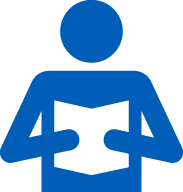Self-employment for people with disability

Download Easy Read
1. Overview
This guide provides information on:
- what self-employment is
- the benefits of self-employment
- the challenges of self-employment
- government programs and supports that are available to people who are self-employed.
2. Introduction
For many people with disability, self-employment provides a way to be financially independent, arrange the workplace to suit a person’s individual needs and achieve job satisfaction.
According to research undertaken by the University of Technology (UTS), people with disability who are employed are over 40% more likely to be self-employed than people without disability.[1]
3. What is self-employment?
Self-employment involves working for yourself. This means you do not work for an employer who pays you a regular salary or wage. Instead you provide products or services to customers, either other businesses or individuals, who pay you directly.
People who are self-employed may also be referred to as small business owners, independent contractors or freelancers.
People who are self-employed work in a variety of occupations. For example they may be a:
- writer
- artist
- photographer
- lawyer
- accountant
- hairdresser
- plumber
- electrician
- barista
- clothing designer
- landscaper
Case study
Running a successful manufacturing business
Andrew Meddings, a Sydney resident, is self-employed and owns a successful pool manufacturing business. He employs four staff, plus a number of contractors. He has lived with a spinal cord injury since a motorbike accident in 2000.
Speaking to the ABC in June 2020, Andrew reflected on his experience of arriving at a job for a new client.
“Someone had recommended me and [the client] had heard great things about my work … When I turned up he said: ‘Jeez, John said your work was amazing, but he didn’t say anything about you being in a wheelchair.” [2]
Reflecting on the experience, Andrew mentioned he was pleased that the new client was surprised he was in a wheelchair, as it meant that the quality of Andrew’s work was more important to his previous client than the fact he had a disability.
4. Benefits of self-employment
The benefits of self-employment will be different for each person, but some benefits include:
- Control over where you work—you may wish to work from an office or business premises, a café or your own home.
- Control over when you work—mornings or evenings may suit you better. Choosing when you work can also give you flexibility to engage in-home support, attend appointments, and meet any carer responsibilities.
- Choice about who you work with—you can choose who you wish to work with, including co-workers and clients.
- Ability to pursue a passion or creative interest—self-employment can allow you to pursue the specific type of work you want to engage in, and in a way that suits you. For example, you might have a passion for helping others, creating new technology or making art.
- Greater financial independence and success—self-employment provides the potential for greater financial independence and success when compared to employment which is likely to be limited to a fixed salary.
Case study
Adam’s Apple
Adam established his own business called ‘Adam’s Apple’. Adam has autism. He approached Food Connect Sydney with the idea of delivering food boxes to people’s houses. He picks up the boxes from the warehouses, and delivers them to the appropriate location.
Adam has been running his business successfully now for over 10 years.
For more information about Adam and his self-employment journey see: CID: Adam enterprise and satisfaction and In Charge: Adams Apple.
5. Challenges of self-employment
It is important to consider the possible challenges of self-employment alongside the benefits:
- Increased range of duties—when you are self-employed you will take on an increased range of duties. In addition to doing your core work (for example, your work as a writer, accountant or hairdresser) you will also have to manage your business. This will mean you need to consider marketing, tax and buying supplies. See section 6 below for further considerations.
- Financial uncertainty—when you are self-employed you will no longer be receiving a regular salary. Instead, your earnings will be tied to the success of your business. If your work commitments are variable, this may result in financial uncertainty at times. There will also be lead times for payments from your customers to consider. For example, you may not be paid for work you carry out for 30 or 60 days.
- Self-motivation—being productively self-employed requires significant self-motivation. Being self-employed means that you will not have a manager directing your workflow or setting milestones for the delivery of work. You will need to manage this and ensure that client or customer deadlines are met.
6. Considerations when thinking about self-employment
When weighing up the benefits and challenges of self-employment, it can be helpful to consider the following questions:
- How will you manage the administration and accounting side of your business?
For example, you may be good at garden maintenance but lack skills in accounting and business administration. You can decide to learn these skills before you get started or you could hire someone to do this for you. You should also consider your tax obligations when deciding on accounting arrangements.
- How will you promote or market your business?
- You need to let people know about the services or products you offer and how to purchase these.
- You should also consider creating a website and securing relevant social media accounts for marketing and information purposes.
- What type of business insurance do you need and are there any specific registrations or licences you may need for your business?
- What measures do you have in place to ensure you have financial security while you establish your business or, for times when business is slower than usual?

Ambassador reflection
“I’m self-employed, so have worked to create employment that suits my condition. I maintain a career touring live shows and making movies.
Travelling in a wheelchair creates some challenges, but with preparation and persistence, these can be overcome.
Employment has always created a positive effect on my psychological well-being. It means engaging with new people and overcoming challenges. Sometimes I have to change my plans because of my evolving condition, but I work with a brilliant team of professional colleagues and carers.”
Tim Ferguson
Comedian/Screenwriter, Stella Rose Productions
IncludeAbility Ambassador
7. Government programs and supports
If you are considering becoming self-employed, you may be eligible for certain government programs, or wish to seek further support from government resources such as:
- Business.gov.au
- New Business Assistance with New Enterprise Incentive Scheme (NEIS)
- SelfStart
- Moneysmart
- the Employment Assistance Fund
- state and territory government support and programs.
7.1 Business.gov.au
Business.gov.au is a website for the Australian business community. It is a simple and convenient entry point for information, services and support to help businesses succeed in Australia.
The website provides a variety of tools and resources including a guide that will take you through each step of starting a business and help you plan for what’s ahead: Business.gov.au: starting a business.
The website also provides information about grants and other funding opportunities available for new businesses, including the Entrepreneurs’ Programme: Business.gov.au: grants and programs and Business.gov.au: entrepreneurs programme.
Guidance on business registrations and licences is also included on the website.
7.2 New Business Assistance with New Enterprise Incentive Scheme (NEIS)
New Business Assistance with NEIS provides individuals, who are not currently in employment, with assistance to start their own business.
The assistance includes:
- accredited small business training
- mentoring and support to help develop your business idea
- an allowance (NEIS Allowance) for up to 39 weeks and rental assistance (NEIS Rental Assistance) for up to 26 weeks, if eligible.
For more information about New Business Assistance with NEIS, visit the Department of Education, Skills and Employment website.
7.3 SelfStart
SelfStart is an Online Hub for people who are looking to start their own business.
The Online Hub has information and resources to support you through the early stages of planning and establishing your business.
For more information about SelfStart, visit the JobSearch website.
7.4 Moneysmart
Moneysmart is an initiative which supports Australians to take financial control of their lives.
It also includes information on starting a small business in its ‘Starting a small business Starter Pack’.
7.5 Employment Assistance Fund
The Australian Government provides funding through the Employment Assistance Fund (EAF) to pay for modifications and equipment.
The EAF is available to eligible people with disability who are:
- about to start a job
- already employed
- self-employed.
If you are self-employed, you must be:
- working for a minimum of 8 hours per week, for 13 weeks or more and
- earn an hourly income that is equivalent to or more than the National Minimum Wage.
The EAF can be used for the following:
- modifications to work vehicles
- equipment for the workplace such as assistive technology and information and communication devices
- Auslan interpreting services
- specialised services and supports.
For more information about the EAF, visit the JobAccess website.
7.6 State and territory government support and programs
To find out what programs and supports are available in your state or territory, visit the relevant business or industry government website:
Endnotes
[1] University of Technology, UTS Business School, Australia’s Entrepreneurial Ecosystem: Experiences of people with disability with microenterprises, self-employment and entrepreneurships, (2020) 7
This guide is part of a suite of resources developed by the Australian Human Rights Commission as part of IncludeAbility to assist:
- employers provide meaningful job opportunities to people with disability
- people with disability navigate barriers to employment.
Further resources are available at www.IncludeAbility.gov.au.


